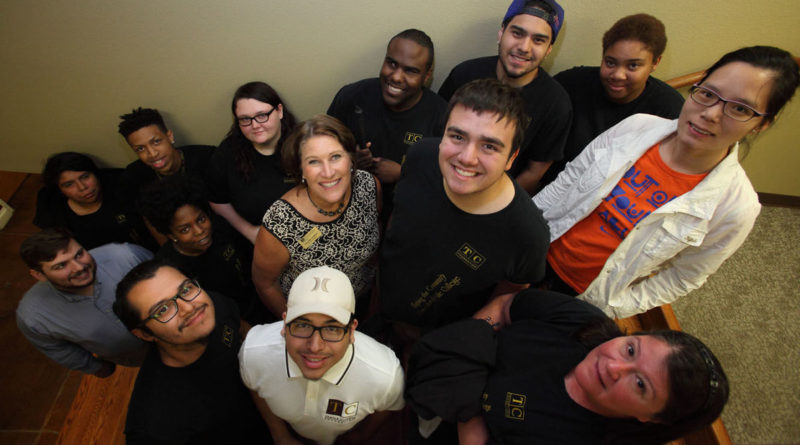A firm foundation
Challenges welcome by traveler, educator and philanthropist
On the islands in the Visyasas region of the Philippines, people struggle every day to find enough food to sustain themselves.
The waters are bountiful with fish and shellfish. In the jungle, fruit trees yield their seasonal harvest. Despite their ability to have enough food to eat, what they eat doesn’t have the nutritional value needed to ward off malnutrition.
“They hunt, fish and gather fruit, but it depends on what you catch, and find,” said Jennifer Graham, Ph.D., executive director of the Temple College Foundation. “Most children from poor families aren’t getting enough protein in their food. They eat rice every day, but aren’t getting enough nutrients to be healthy.”
Graham said bananas are good, but people still don’t get enough vitamin A and C. “They can eat mangoes, but they’re only seasonal,” she said.
Graham recently returned from a six-week trip to the Philippines where her mission was to teach the people about nutrition, sanitation and economic development.
She traveled with four student team members (three had never been out of the state, let alone the country), on a travel grant from the Rotary District 5870 and the Rotary Club of Temple. On this trip, Graham, a world traveler, and her team, visited six islands and cities where they taught 500 women in rural villages construction skills and how to build a solar-powered food dehydrator “to provide livelihood opportunities and sustainable nutrition through preserved foods,” she said.
Working with the Rotary Clubs in each city that provided lodging and meals for the team, Graham and her team, local residents and Rotary Club members worked 10 hours a day for three days to build one dehydrator.
“Once we were introduced, we would go to town to buy the supplies we needed for a build,” Graham said.
The Visyasas region is an underdeveloped area and although Graham said people aren’t starving, there is a high incidence of malnutrition.
By building the dehydrator and teaching the community how it works — there are no moving or mechanical parts and it is operated by the sun — they can take their crops and preserve them for all seasons.
Eleven dehydrators were built, including one for a school, a women’s association that can now dehydrate snacks to be sold, an orphanage and a farmer’s association.
“The farmers association harvests mushrooms, squash and root crops,” she said. “They make chips from the squash. Fresh food is caught or hunted. Children go out at low tide to collect sea urchins, mussels and shellfish.”
Because there is no refrigeration, any meat they catch has to be hung out to dry, and attracts legions of flies. Any fish they catch is dried on the side of the road and is walked on by people and water buffaloes.
The dehydrator is a one-piece structure that has a tower to hold up to eleven trays of food. As hot air rises into the tower, it removes moisture from the food and the moisture escapes through the tower’s vents.
“On a sunny day, it takes seven hours to dry a tower of food,” Graham said.
With a dehydrator, they can dry sardines, a source of protein, in a day.
In each area where they built, they bought supplies from local merchants, and at the end of the build, they donated the leftover supplies to the townspeople.
“It was emotional, powerful. There were a lot of tears and the team’s lives were changed forever,” Graham said.
Funding a college
In her role as the executive director of the Temple College Foundation, Graham is responsible for $7 million in assets and manages the student housing complex and the historic building where the Foundation is based.
“A $5 million endowment provides annual scholarships, while the Leopard Loan Program provides more than $100,000 annually to assist students with no-interest loans that allow them to get into or stay in classes,” Graham said.
The Foundation also helps with scholarships, teacher awards, gifts to the college, including a $1 million gift for an addition at the Mary Marshall Activities Center.
Graham is responsible for three major fundraisers each year: the Drive for Scholarships Annual Golf Classic, the Kings of Cuisine, a Cruise for the College, and the Low Brow High Brow Tea that “brings donors and scholars together to allow them to meet, encourage each other, and understand both the values of giving and achieving.”
She is at the helm of the Workforce Preparation Program that offers on-the-job training for students “in every area of the workforce with a specialization in soft skills like accountability, productivity and customer service.”
“They get to know what to expect in the work place,” she added.
Graham said up to 20 students per semester work the program at the Foundation. “They do everything from creating and printing marketing materials, answering phone calls, cleaning, maintenance and running fundraising events,” she said. “They are all project managers and must manage their own project plans.”
Students in the program are responsible for finding their own resources and meeting their own deadlines.
“We are empowering, teaching and giving responsibility to the students,” she said. “If they screw up, we call them out for it in the hope they don’t make that same mistake.”
Students can stay in the program for a semester or their entire college career.
“Once they work with us they know I’ll vouch for them,” Graham said.
Local businesses approach Graham when they have job openings. They know her students are ready to work.
“We have a good placement program with students wanting to move into the workforce post graduation,” she said.
A passion for teaching
Graham shares her life with husband, Temple City Manager Jonathan Graham, whom she met when she was living in Arizona. A mutual friend introduced them, knowing they would like each other. But he lived in Central Texas and she was in Arizona. He asked her to look for a job in Texas and she was hired by the Temple Independent School District in 2000 and she moved to Temple to marry Jonathan. But that didn’t stop Jennifer’s wanderlust for service travel.
“I love adventure travel, but service travel is different,” Graham said. “Service travel feeds my soul.”
She worked at Temple ISD as a teacher and later a principal until 2009, when she accepted the position at the Temple College Foundation.
Graham’s unique early life experiences helped to shape the educator that she became.
She was born blind to a teenage mother and father who gave her up for adoption, and was raised by a loving couple who adopted her. Her parents did everything they could to restore her vision and she endured several surgeries in childhood to regain the vision in her right eye.
Graham grew up in Lake Tahoe, Calif. Her mother was an insurance broker and her father was a 747 pilot for Pan Am Airlines and flew internationally during the 1960s, ’70s and ’80s.
By the time she was 18, she discovered her travel privileges and for six years, she spent every moment she could in an airplane, hopscotching across the globe from one Pan Am airport to the next, in alphabetical order.
“I’ve been all over,” she said. “I did a lot of traveling, attended Oxford for one year and an academy in Venice.”
Graham said she was looking for challenges and international travel afforded her that luxury.
“Travel challenged me to think and understand things I don’t see or feel here all the time. Travel makes me understand things in new ways,” she said.
She saw her travels as a cultural revolution and used travel to learn about different cultures, history and international politics. When she traveled, it wasn’t as a tourist. She traveled to the places locals would go to gain that intimate experience.
Her international experience, and a little tune called “Bullet the Blue Sky” by U-2, that she heard at one of their concerts, steered her into the direction of education.
She received her Bachelor’s of Liberal Arts from the University of San Diego, a master’s in educational administration from the University of Phoenix, and her Ph.D. from Bernelli University.
“At all three institutions, my focus was on inner city and third world education, which allowed me to teach in four countries, on three continents and in three states,” she said, adding that this past Christmas she spent two weeks in China teaching English.
During her career as an educator, she has taught in elementary, middle and high schools from Arizona to Temple, and said her favorite position was as principal at the K-12 grade Disciplinary Alternative School in Temple.
“We developed programs based on good teaching practices,” she said. “It was engaged teaching and learning from 7 a.m. to 5 p.m., a longer day for students and a harder day for teachers,” she said. If students didn’t get a C or above, Graham said they used extra time for tutoring; if they maintained a C or above they were allowed to participate in extra-curricular activities.
Some of those activities included yoga for anger management, working in a community garden and Frisbee golf.
“We would put students in charge of teams and it had a concrete reward system, but rewards were not concrete,” she said.
Students gained self-fulfillment and self-respect. They were in charge of themselves and maybe other people.
“We saw kids who came in as a jerk and became a team leader,” she said. “Once you give people the opportunity to manage themselves, they will take the reins.”
Working with students and teachers from around the world taught Graham to be resourceful and determined.
She’s seen children in Barbados gather under a tree and call that a classroom. She’s visited libraries in the Philippines that consisted of nothing more than castoff third-grade handwriting books from California.
“But those limitations don’t define learning,” she said. “They may be hurdles, but they are not boundaries.”
Catherine Hosman is editor of Tex Appeal Magazine. Contact her at editor@texappealmag.com or 254-501-7511.




